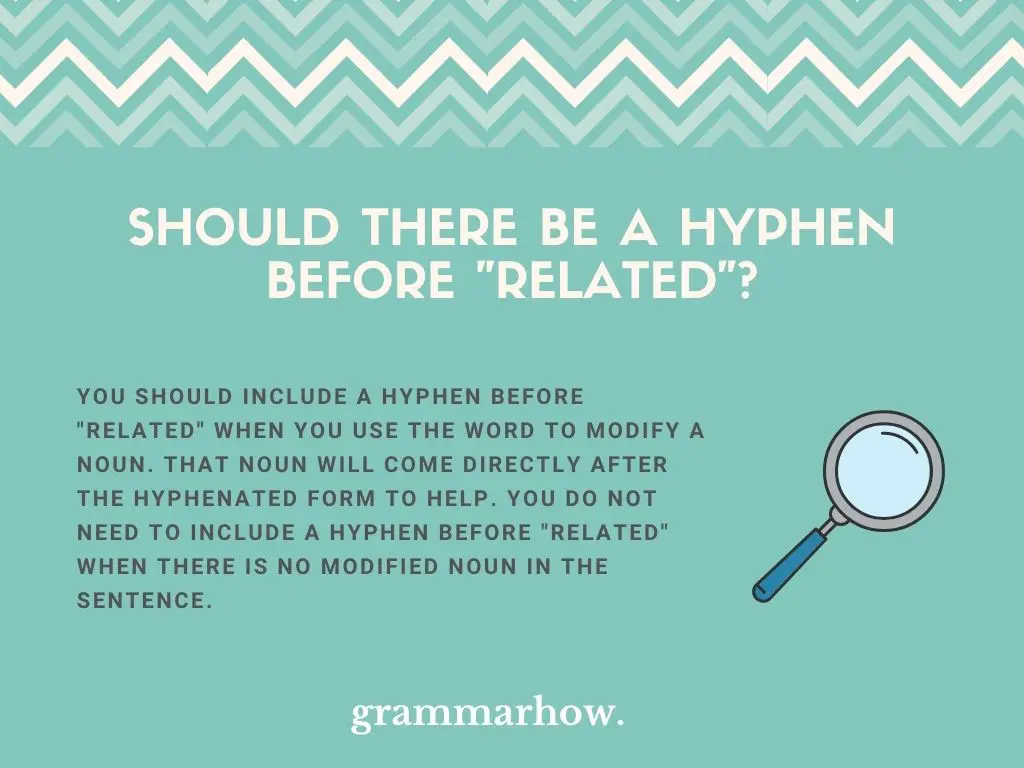“Related” is a common suffix that you’ll find in words. But, some people wonder if it always needs to be hyphenated. According to some English rules, it does, but there are plenty of others where it doesn’t. This article will give you the definitive answer.
Should There Be A Hyphen Before “Related”?
You should include a hyphen before “related” when you use the word to modify a noun. That noun will come directly after the hyphenated form to help. You do not need to include a hyphen before “related” when there is no modified noun in the sentence.

Basically, there are a set of hyphenation rules related to the AP Style that you need to understand. It involves learning how hyphens interact with different words to modify the nouns that come after them.
We’ll get to that in a later section, but for now, you can refer to these examples:
- Noun: This is all work related, which is why I am getting it done now.
- Adjective: The work-related project is taking much longer than I would have liked!
Related with a hyphen
“Related” is written with a hyphen before it when it is a compound adjective. We can treat “-related” as a suffix, even though it is an official word that allows for a hyphen to be placed between it and the root word. This is a common English rule that must be followed.
You would always have to hyphenate “related” words when they come directly before nouns.
- Work-related project
- School-related issue
- Girl-related problems
However, you also do not need to worry about the hyphen when the nouns do not come directly after it. In the above examples, “project,” “issue,” and “problems” are the nouns we modify, which should help you to understand what we’re talking about.
Here are some more examples to help you out:
- I have a few work-related issues that I’ve got to get through tonight.
- These event-related plans are all over the place! I need to get them sorted.
- I have a wedding-related meeting to go to today! I’m so excited.
- Is this a party-related discussion? We’re supposed to keep it secret!
We can refer to the AP Stylebook when we hyphenate words in this way. According to the AP Style, hyphens work as linkers between multiple words. If those words all connect to modify the same noun, a hyphen is required when we want to demonstrate this.
Without a hyphen, whatever word comes before “related” would end up being the modifier. That could get very confusing for some readers. For example:
- Correct: Work-related issue
- Incorrect: Work related project
We used boldface to highlight the adjectives in each case. The first example clearly shows that “work-related” modifies “issue.” The second example shows that “work” modifies “related,” which means that “project” doesn’t get modified.
Related without a hyphen
You do not need to hyphenate “related” words when they are not used to modify a noun. If the noun does not come directly after it, it’s likely that you should keep the hyphen out of it. Some people still like to include the hyphen, though (it’s based mainly on style choice).
In AP Style, the hyphenated form makes sense whether there’s a noun present or not. However, in other writing styles, it’s suitable to drop the hyphen when it is not relevant to the modification in the sentence.
So, technically, both of the following are correct:
- AP Style: This is all work-related.
- Other Styles: This is all work related.
However, if in doubt, it would make more sense just to keep it unhyphenated because there are more styles that follow this rule than those that don’t.
When it is unhyphenated, “work related” (or any “related” word) becomes a noun rather than an adjective. This is the important distinction you need to make between them.
Check these examples out to help you:
- I am not doing anything school related for the rest of the week!
- Work related or not; I’m not going out there to do something so reckless.
- I think you should look into something more family related that we can all take part in with you.
- I don’t have time for any of this business. It’s far too work related for me to have fun with it!

Martin holds a Master’s degree in Finance and International Business. He has six years of experience in professional communication with clients, executives, and colleagues. Furthermore, he has teaching experience from Aarhus University. Martin has been featured as an expert in communication and teaching on Forbes and Shopify. Read more about Martin here.
